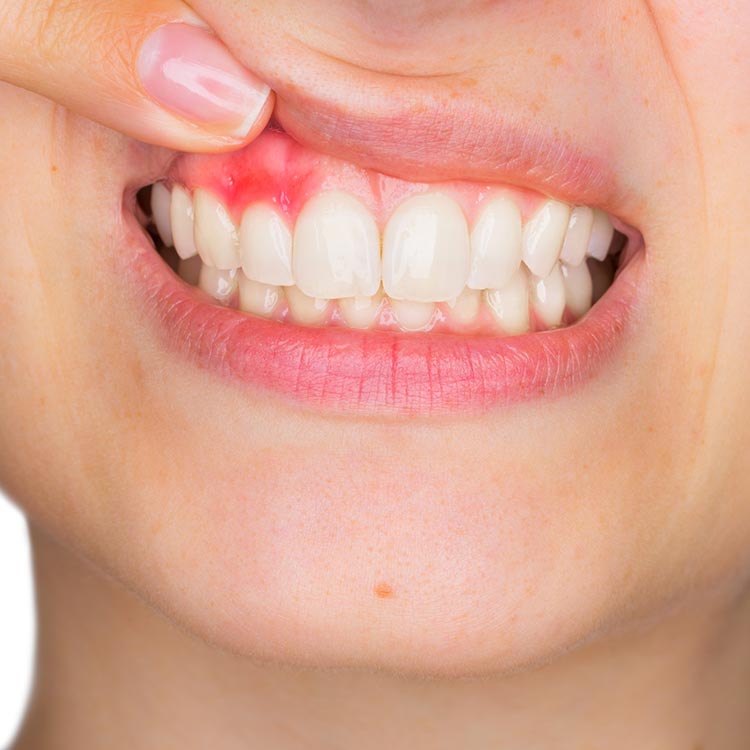
Treatment of Gum Disease - Periodontics
According to the Canadian Dental Association, gum disease is the most common dental problem as well as the most common cause of tooth loss among adults, when not treated. It can progress without notice until it becomes a big problem that can lead to the destruction of the structures supporting your teeth and potentially cause tooth loss.
Periodontal care at Pointe-Claire Dental
At Pointe-Claire Dental we are committed to your dental and overall health. Dr. Mauricio Galvis, dentist in Montreal West Island, recommends a complete periodontal examination/screening when he has observed signs of gum disease during your oral exam. This simple and relatively painless procedure allows him to diagnose the severity of the periodontal disease.
During this appointment, we will take six different measurements around each tooth using a special tool to determine the depth of the space between the tooth and the gum. We will also evaluate gum recession, loosening or mobility of the teeth, and check for bone loss, bleeding and inflammation. Additionally, we will assess your individual risk factors.
A precise diagnosis is crucial in order to elaborate a treatment plan with predictable and long- term results.
The recommended treatment(s) will be determined by the stage of the disease, your overall health and how you have reacted to earlier dental treatments, if applicable. Depending on the outcome of your periodontal exam, Dr. Galvis may also refer you for a consultation with a periodontist.
Causes of periodontal disease
Gum disease is mainly caused by plaque (also called biofilm), a sticky film of bacteria that forms on the teeth. Plaque may eventually harden into tartar (also known as calculus), a hard mineral shell that irritates and inflames healthy gum tissue and causes gingivitis, the early stage of gum disease.
Signs of periodontal disease

- red and puffy gums;
- traces of blood on your toothbrush and
- bad breath.
If gingivitis is left untreated, pockets of infection begin to form between the teeth and the gums and may erode the tissue that attaches the tooth to the bone.
This stage, caused by ongoing inflammation and infection, is called periodontitis. Additional manifestations are receding gums as well as sensitive and loose teeth.
If you are experiencing any of these symptoms or think that you are at high risk of developing gum disease, you should visit the dentist without delay.
Gum disease and its effects on your general health
Recent studies suggest that bacteria associated with periodontal disease can enter the bloodstream through your gums leading to several medical conditions, such as diabetes, heart disease and artherosclerosis, premature births or low birth weight infants, osteoporosis, cancer, Alzheimer’s and respiratory diseases.
Your likelihood of developing periodontal disease and the severity and speed at which it may occur may be increased by individual risk factors, such as genetic susceptibility, poor oral hygiene, smoking, hormonal variations, diabetes, stress, poor nutrition (excess sugar is one of the primary causes of dental problems including gum disease), crooked or misaligned teeth and use of certain medications.
How to prevent gum disease
Gum disease can be treated and may be reversed in its early stages, but most importantly, it can be prevented. Here are some simple ways to do it:
- brush your teeth and tongue at least twice a day and floss once a day;
- eat a healthy balanced diet;
- do not smoke;
- know your risk. Is there anyone is your family who has periodontal disease?;
- have a dental exam and professional cleaning regularly. Early detection will allow to treat any symptoms before they become more serious.
Treatment for gum disease in Pointe-Claire
Periodontal debridement therapy, also known as deep cleaning, is the recommended method to treat gum disease. It includes scaling and root planing. The goal of this therapy is not only to remove calculus and plaque, but to stop disease progression and control bacterial growth in order to re-establish periodontal health. Antibiotics may be prescribed in some cases.
Scaling involves the removal of plaque (biofilm) and tartar beneath the gum line using manual and ultrasonic instruments. Ultrasonic instruments clean plaque from the teeth with a vibrating metal tip combined with a cool water spray. The tip chips off the tartar while the water flushes out the pocket.
Root planing typically follows scaling. It reaches deeper to smooth out the rough spots and remove any residual tartar on the root surface to allow the gum tissue to heal and reattach to the root, and ultimately close up the pockets where bacteria was growing. At Pointe-Claire Dental, we always apply a special topical anesthetic to numb the gum to make the procedure more comfortable for our patients.
You may experience some swelling and bleeding and possible teeth sensitivity for a short while after these procedures. If that is your case, we may recommend a desensitizing toothpaste and mouthwash to manage your discomfort.
Depending on the amount of plaque and tartar that needs to be removed, scaling and root planing may require more than one visit to complete.
Regular scaling appointments are required as part of a maintenance plan to keep periodontal disease under control.
These, along with the strict adherence to your daily routine of brushing and flossing are of the utmost importance to prevent plaque from building again in the areas that were treated.
